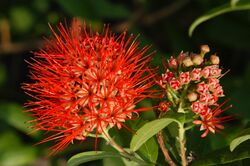Biology:Combretaceae
| Combretaceae | |
|---|---|

| |
| Combretum constrictum inflorescence | |
| Scientific classification | |
| Kingdom: | Plantae |
| Clade: | Tracheophytes |
| Clade: | Angiosperms |
| Clade: | Eudicots |
| Clade: | Rosids |
| Order: | Myrtales |
| Family: | Combretaceae R.Br.[2] |
| Type genus | |
| Combretum Loefl.
| |
| Genera | |
|
18, see text. | |
| Synonyms | |
| |
The Combretaceae, often called the white mangrove family, are a family of flowering plants in the order Myrtales. The family includes about 530 species of trees, shrubs, and lianas in ca 10 genera.[4] The family includes the leadwood tree, Combretum imberbe. Three genera, Conocarpus, Laguncularia, and Lumnitzera, grow in mangrove habitats (mangals).[5] The Combretaceae are widespread in the subtropics and tropics. Some members of this family produce useful construction timber, such as idigbo from Terminalia ivorensis. The commonly cultivated Quisqualis indica (as well as the entire former genus Quisqualis) is now placed in the genus Combretum. Many plants in the former Quisqualis genus contain the excitotoxin quisqualic acid, a potent AMPA agonist.[6]
White mangroves
The family name comes from the type genus Combretum; it also includes the white mangrove, Laguncularia racemosa, found along seacoasts in tropical America and West Africa.
Genera
Plants of the World Online currently includes:[7]
- Combretum Loefl.
- Conocarpus L.
- Dansiea Byrnes
- Getonia Roxb. (synonym Calycopteris)
- Guiera Adans. ex Juss.
- Laguncularia C.F.Gaertn. (monotypic)
- Lumnitzera Willd.
- Macropteranthes F.Muell.
- Strephonema Hook.f.
- Terminalia L. (synonyms: Anogeissus, Buchenavia, Bucida, Pteleopsis, Terminaliopsis)
synonyms of Combretum
- Meiostemon Exell & Stace
- Quisqualis L.
- Thiloa Eichler[8]
References
- ↑ "Myrtales". https://mobot.org/MOBOT/research/APweb/orders/myrtalesweb2.htm.
- ↑ Angiosperm Phylogeny Group (2009). "An update of the Angiosperm Phylogeny Group classification for the orders and families of flowering plants: APG III". Botanical Journal of the Linnean Society 161 (2): 105–121. doi:10.1111/j.1095-8339.2009.00996.x.
- ↑ "Family: Combretaceae R. Br., nom. cons.". Germplasm Resources Information Network. United States Department of Agriculture. 2003-01-17. http://www.ars-grin.gov/cgi-bin/npgs/html/family.pl?280.
- ↑ Christenhusz, M. J. M.; Byng, J. W. (2016). "The number of known plants species in the world and its annual increase". Phytotaxa 261 (3): 201–217. doi:10.11646/phytotaxa.261.3.1. http://biotaxa.org/Phytotaxa/article/download/phytotaxa.261.3.1/20598.
- ↑ "Lumnitzera". University of Queensland. http://www.mangrovewatch.org.au/index.php?option=com_content&view=category&layout=blog&id=38&Itemid=300170.
- ↑ Munir, Muhammad; Lu, Lisha; McGonigle, Paul (1995). "Excitotoxic cell death and delayed rescue in human neurons derived from NT2 cells". Journal of Neuroscience 15 (12): 7847–7860. doi:10.1523/JNEUROSCI.15-12-07847.1995. https://www.jneurosci.org/content/jneuro/15/12/7847.full.pdf.
- ↑ Plants of the World Online: Combretaceae R.Br. (retrieved 19 January 2022)
- ↑ "GRIN Genera of Combretaceae". Germplasm Resources Information Network. United States Department of Agriculture. http://www.ars-grin.gov/cgi-bin/npgs/html/gnlist.pl?280.
External links
Wikidata ☰ Q44002 entry
 |
